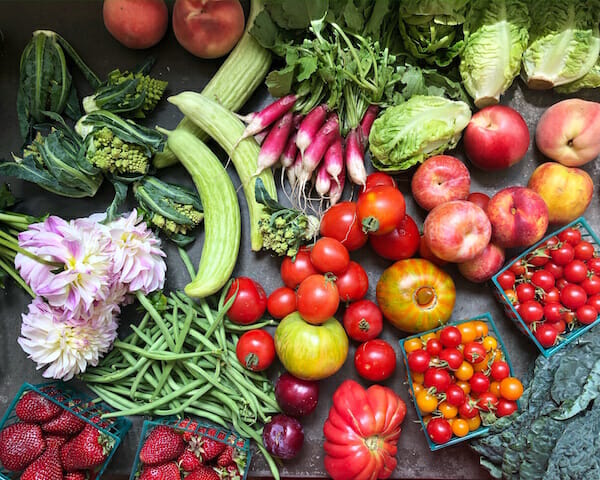Forty percent of food produced in the U. S. goes uneaten according to a report by the Academy of Nutrition and Dietetics (AND). That’s an astounding figure, and a concerning one too, since food waste has some serious consequences. First off, it’s hard on the wallet. The average family loses nearly $1500 a year to food waste according to the AND report. And wasted food impacts the environment in a number of ways, including the fact rotting food emits greenhouse gases (it has double the impact of commercial aviation, in fact). So, what’s the average Jane to do? I aim to minimize waste in my own kitchen, which is tricky business when all the recipe testing I do results in surplus food. But I’ve found a slew of steps which I’ll share here as my 10 ways to stop food waste.
10 Ways to Stop Food Waste:
1. Use what you have
Take an inventory of what’s in your pantry before you plan meals. Figure out how to work in the vegetables you have on hand before you buy new ones, for example. And when you do write a shopping list, check to make sure you don’t already have that can of diced tomatoes or tub of yogurt tucked in the back somewhere.
2. Get creative
Part of using what you have is getting creative with ingredients. Who says you can’t make chili with chick peas or muffins with raspberries instead of blueberries? When you do have leftovers, serve them a little differently the second time around to keep things interesting. Leftover taco meat becomes taco salad. Leftover roast chicken and broccoli transforms into paninis with a slice of provolone. Leftover bolognese sauce gets spooned over polenta or farro instead of pasta.
3. Share excess food with friends
Manage food waste AND get popular in one fell swoop by sharing excess with friends and neighbors. I do this often, and it usually starts with a quick text that reads something like, “Hey, I have more chopped salad/oatmeal cookies/ripe pears than we can eat, can I drop them by this afternoon?” Nine times out of 10 the answer is yes!
4. Embrace the underdog
Don’t overlook homely apples or misshapen pears in favor of shinier, prettier ones. They’re likely just as tasty, but may land in the garbage because nobody has bothered to buy them. Another way to support the underdogs of the fruit and vegetable world, is to check out Imperfect Foods, a company devoted to minimizing food waste.
5. Make use of your freezer to stop food waste
As soon as you know you’re not going to get through something before it goes bad, whether it’s a basket of strawberries or half of a chicken, freeze it. Those strawberries will be perfect for smoothies and that half chicken (along with a few neglected vegetables) will transform into an excellent broth.
6. Store food smart
When you do use your freezer, wrap everything well in plastic, freezer bags, or sturdy containers and LABEL THEM. Write what’s in there and the date. You think you’ll remember, but if you’re anything like me, you won’t.
7. When you eat out, share
Restaurant portions tend to be super-sized, so sharing will not only cut down on food waste, it could be good for your waistline too.
8. Don’t believe what you read
Understand what the dates stamped on food mean. The “sell by” date indicates when the store should stop selling a food not when you should stop eating it. The “best if used by” date indicates the end of peak quality, but these foods are often perfectly edible well past the date.
9. Buy what you need
The supermarket is prime territory for temptation. Fill your cart with just what you need and when that new brand of chocolate oat milk grabs your eye, remind yourself that you can always get it the next time around when you have more room in the fridge.
10. Consider leftovers part of a higher purpose
So maybe it would be more fun and delicious to order in or make something fresh and new, but rummaging through your fridge and using what you have is doing something good for your wallet and for your lovely planet. Keep that in mind. It helps.
How do you deal with food waste? I’d love your tips and ideas, too!
If you have ideas beyond these 10 ways to stop food waste, please share!
You’ll also find more tips by heading here and this terrific book by registered dietitian Rosanne Rust
